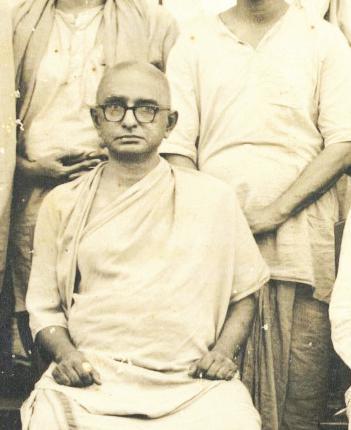
2 minute read
Pariprasna
Srimat Swami Tapasyananda Ji (1904 – 1991), was one of the Vice-Presidents of the Ramakrishna Order. His deeply convincing answers to devotees’ questions raised in spiritual retreats and in personal letters have been published in book form as Spiritual Quest:
Questions & Answers. Pariprasna is a selection from this book.
Advertisement
QUESTION: The Lord has said in the Gita: ‘You are competent only to act but not to claim the results of your actions.’ This is very difficult to practise. Is there any way to make this practicable?
MAHARAJ: So long as we are absolutely self-centred, it is impossible for us to practise this teaching. For it is only the result or the gain out of a work that makes a self-centred person exert himself. So the only way to put the Gita’s teaching into practice is first to discipline ourselves by identifying ourselves with bigger and bigger ‘wholes’. An animal only eats, sleeps and mates except when certain instinctive drives in certain species goad them to work for the species. The ‘animalman’ is also like that. He exists for his food and his pleasures. But as his self gets identified with a group, say, his family and is thus drawn out and expanded, he learns to work to some extent without personal ‘compensation’ and in the interest of a bigger group, the family. As he evolves, the ‘whole’ or ‘group’ with which he identifies himself will also grow bigger and bigger, progressing towards a universal ideal. Thus he can become the leader of a village, of his community, of his country, of his race and of humanity. To the extent he identifies himself with these progressively expanding ‘wholes’ or ‘groups’ he becomes capable of greater and greater personal sacrifices for the good of the greater ‘wholes’ with whom he identifies himself.
Now if a person is a devotee of God in truth and in spirit, he accepts the whole universe as His and also as His expression, and becomes capable of doing everything as His service. There should however be genuine enlightened faith and devotion, if one were to act in this way. But most of those who say they have faith in God and devotion for Him, have only pseudo-faith and pseudo-devotion, and these will never, help one to attain to that sense of joy and elation which work done without personal motive, as a service of God, would bring. Indifference and irresponsibility alone can be the result of pseudo-faith and pseudo-devotion. One who is fit to follow the Gitaideal would put his best into his work, although he does not personally gain anything by it. Even where conditions of life require the acceptance of a salary for subsistence in the world, his work is not regulated by his salary but by the urge he feels for doing the work to the best of his capacity, as he is doing it for the Lord who is the Master of everything.
People who have not got this kind of true faith and devotion would be well-advised not to stand on that highest ideal expounded in the Gita, but on the lesser ideals described earlier, namely, identification with groups or ‘wholes’ like the community, country, humanity, etc. If the love for these bigger ‘wholes’ is genuine, man will grow in strength and detachment and will gradually be able to dedicate all his works to God. An absolute and living faith in Divine reality is needed for this discipline.







